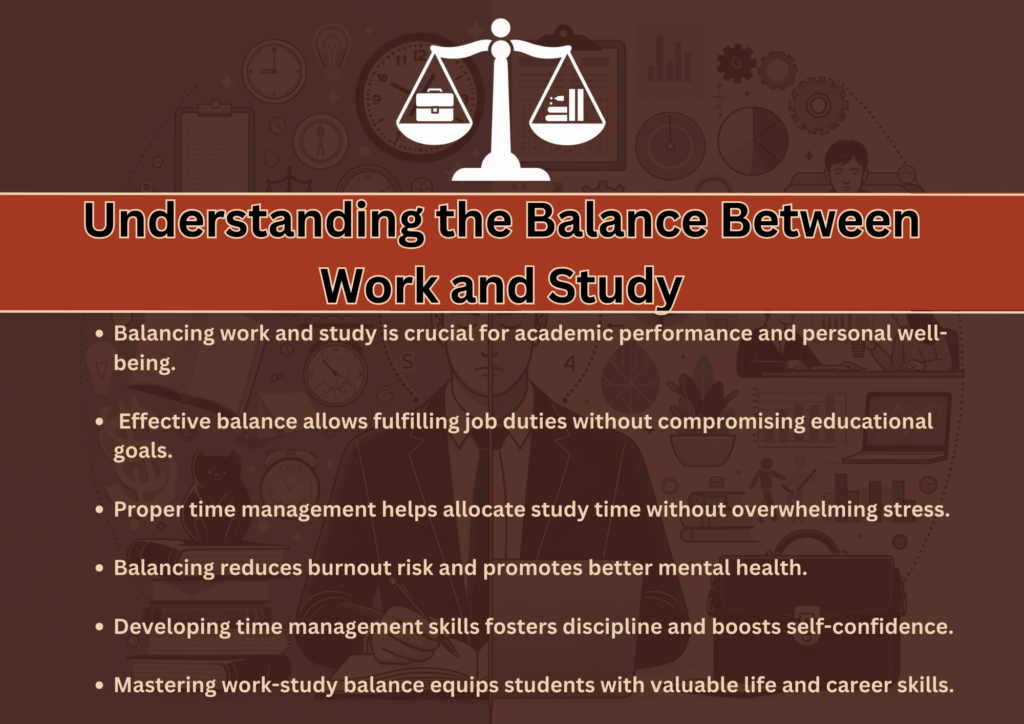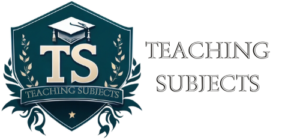Introduction
Balancing the demands of college coursework with job responsibilities is a challenge many students face. Juggling assignments, exams, and job duties can lead to significant stress and time constraints. It becomes crucial for students to adopt effective time management strategies to navigate these competing priorities successfully. Without proper planning, the quality of academic work and job performance can suffer, potentially impacting a student’s overall well-being and prospects. This blog post will explore practical tips and techniques to help college students maximize their study time while at work, ensuring they can achieve success in both arenas.

Understanding the Balance Between Work and Study
Balancing work and study is crucial for college students as it directly affects their academic performance and personal well-being. An effective balance allows students to fulfill job responsibilities while ensuring their educational goals are not compromised. Proper time management skills enable students to allocate sufficient time for studying, completing assignments, and preparing for exams without overwhelming stress. This balance reduces the risk of burnout and promotes better mental health by preventing fatigue from overextending oneself. Additionally, successful time management helps develop a disciplined approach to work and study, fostering a sense of achievement and boosting self-confidence. Ultimately, mastering the balance between work and study equips students with valuable skills that will benefit their professional careers and personal lives.

Identifying Opportunities for Study Time at Work
To effectively integrate study time into your work schedule, thoroughly analyze your daily and weekly work patterns. Take note of any consistent downtimes, such as slower periods during your shift, less busy days of the week, or time gaps between tasks. You can strategically plan when to focus on your coursework by identifying these pockets of time. For instance, if you notice that the beginning of your shift is typically less hectic, you can use this opportunity to review lecture notes or work on assignments. Additionally, create a detailed schedule that incorporates both your work and study tasks, ensuring that you allocate specific blocks of time for each activity. This systematic approach will help you maintain a balanced workload and prevent important tasks from slipping through the cracks.
Utilizing breaks is another key strategy for maximizing study time while at work. Instead of spending your lunch or coffee breaks scrolling through social media or engaging in idle chit-chat, consider using this time for productive study sessions. Short, focused bursts of study can be surprisingly effective in reinforcing concepts and making progress on assignments. Additionally, communicate openly with your employer about your educational commitments. Many employers are supportive of their employees’ academic pursuits. They may be willing to offer flexibility, such as adjusting your shift hours or allowing you to work on less demanding tasks during slower periods. Establishing a transparent line of communication can lead to a more accommodating work environment, making it easier to balance your dual responsibilities.
Organizing Your Study Material
Prioritizing tasks is essential for making the most out of your limited study time while at work. Begin each week by listing all your academic responsibilities, such as assignments, readings, and upcoming exams, then rank them based on their due dates and importance. Focus on completing high-priority tasks first, breaking them down into smaller, manageable parts that can be tackled during short work breaks or downtimes. This method helps keep your academic workload under control and prevents last-minute cramming sessions that can lead to increased stress by giving you a clear sense of what needs to be done and when you can make more efficient use of your study periods at work.
Keeping your study materials handy is crucial for seamless transitions between work and study. Create a portable study kit with essential items such as textbooks, lecture notes, flashcards, and any electronic devices or chargers you might need. Store this kit in a backpack or a convenient spot at your workplace so you can easily access it whenever an opportunity to study arises. Digitizing your study materials can also be beneficial; use cloud storage services to keep important documents and notes accessible from any device. This way, you are always prepared and can immediately dive into studying without wasting time searching for materials or returning home to fetch forgotten items.
Effective Study Techniques During Work Hours
One highly effective way to maximize study time while at work is through microlearning. This strategy involves breaking down complex topics into smaller, more manageable chunks that can be quickly reviewed during downtime. Microlearning reduces cognitive overload and enhances retention by focusing on short, focused bursts of information. For instance, instead of trying to read an entire chapter during a single lunch break, you could focus on summarizing key points and concepts in just a few pages. This method reinforces concepts over time and easily fits into a busy work schedule. Using microlearning apps that offer brief quizzes and interactive activities can further enhance your comprehension and recall abilities.
Incorporating active learning strategies can also significantly boost the effectiveness of your study sessions during work hours. Instead of passively reading or listening to the material, engage with the content by using flashcards, creating summaries, or teaching the material to someone else. Flashcards and other memory aids, like mnemonics, can be particularly helpful for quick reviews and reinforcing key facts and concepts. Moreover, listening to educational content such as lectures, podcasts, or audiobooks during commutes or while performing less demanding tasks can provide an additional avenue for learning. By actively engaging with the material, you improve retention and develop a deeper understanding of the subject matter, setting a strong foundation for academic success while effectively managing your work responsibilities.
Leveraging Technology
Productivity apps, online study groups, and digital resources can greatly enhance your ability to balance work and study. Productivity apps like Trello, Asana, and Evernote help you organize tasks, set reminders, and track your progress, ensuring nothing falls through the cracks. Online study groups provide a platform for collaborative learning, allowing you to share resources, ask questions, and discuss concepts with peers, which can deepen your understanding of the material. Additionally, leveraging digital resources such as e-books, academic databases, and educational platforms like Coursera or Khan Academy offers flexibility and accessibility, enabling you to study anywhere and anytime. Integrating these technological tools into your routine allows you to optimize your study time, make learning more interactive, and maintain a structured approach to your educational pursuits, even amidst a busy work schedule.
Maintaining Productivity and Focus
Setting specific goals is fundamental to maintaining productivity and focus while balancing work and study. Start by defining clear, attainable objectives for each study session, breaking down large tasks into smaller, manageable goals. This approach not only provides a sense of direction but also helps in monitoring progress. For example, instead of setting a vague goal like “study for the exam,” specify what you aim to accomplish, such as “review chapters 3 and 4 and complete practice questions.” Having precise goals can enhance motivation and make it easier to stay on track, even during short study periods. Regularly reviewing and adjusting these goals based on your progress can ensure that you remain focused and aligned with your academic targets.
Minimizing distractions is equally critical to sustaining productivity. Identify common sources of distraction during your study time and actively work to mitigate them. This might involve finding a quiet space to study, using noise-canceling headphones, or utilizing apps that block access to distracting websites and notifications. Time management techniques such as the Pomodoro Technique, which involves working in focused intervals with short breaks in between, can also improve concentration. Integrating these focused work periods with your daily schedule allows you to maintain high productivity levels without feeling overwhelmed. Maximize study time while at work by combining clear goal-setting with effective distraction minimization strategies and disciplined time management, creating an optimal environment for productive and focused study sessions while ensuring your work and academic responsibilities are met efficiently.
Taking Care of Your Well-being
Taking care of your well-being is crucial when balancing work and study commitments. Scheduling regular downtime is essential; it allows your brain to rest and recharge, preventing burnout and maintaining overall productivity. Establish a routine that includes short breaks during study sessions and longer periods of relaxation during weekends. Incorporate healthy habits into your daily life, such as maintaining a balanced diet, staying hydrated, and getting adequate sleep. Mindfulness practices like meditation, deep-breathing exercises, or yoga can help you stay centered and manage stress effectively. Additionally, identify and develop stress management strategies that work for you, whether that’s through physical activity, hobbies, or social interactions. By prioritizing your well-being, you create a sustainable balance that enhances your academic performance and work efficiency.
Conclusion
Maximize study time while at work to efficiently advance your academic ambitions without compromising your professional responsibilities. You can enhance your retention and comprehension in short, manageable bursts by utilizing microlearning techniques and active learning strategies. Leveraging technology helps optimize your study environment and facilitates collaboration while setting specific goals and minimizing distractions, which can significantly boost your productivity and focus. Taking care of your well-being is crucial to maintaining a sustainable balance between work and study. Experimenting with different strategies to see what best fits your unique schedule and learning style is key. This holistic approach helps you thrive academically and ensures you manage your work duties effectively, paving the way for a balanced and successful career journey.
















